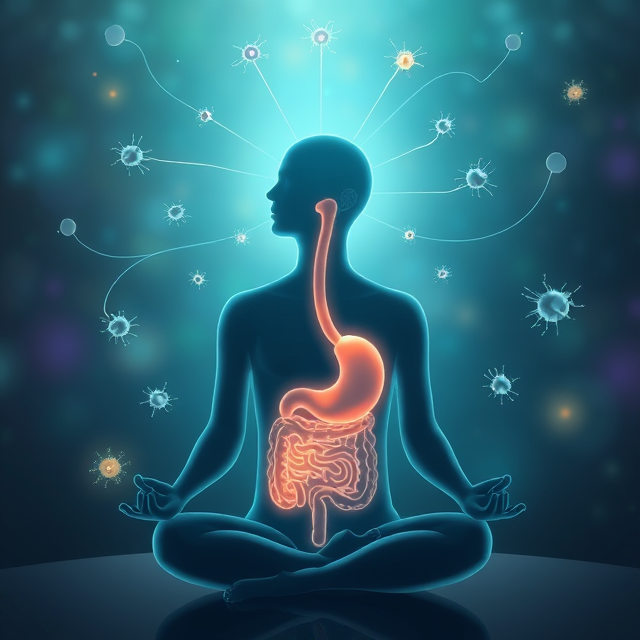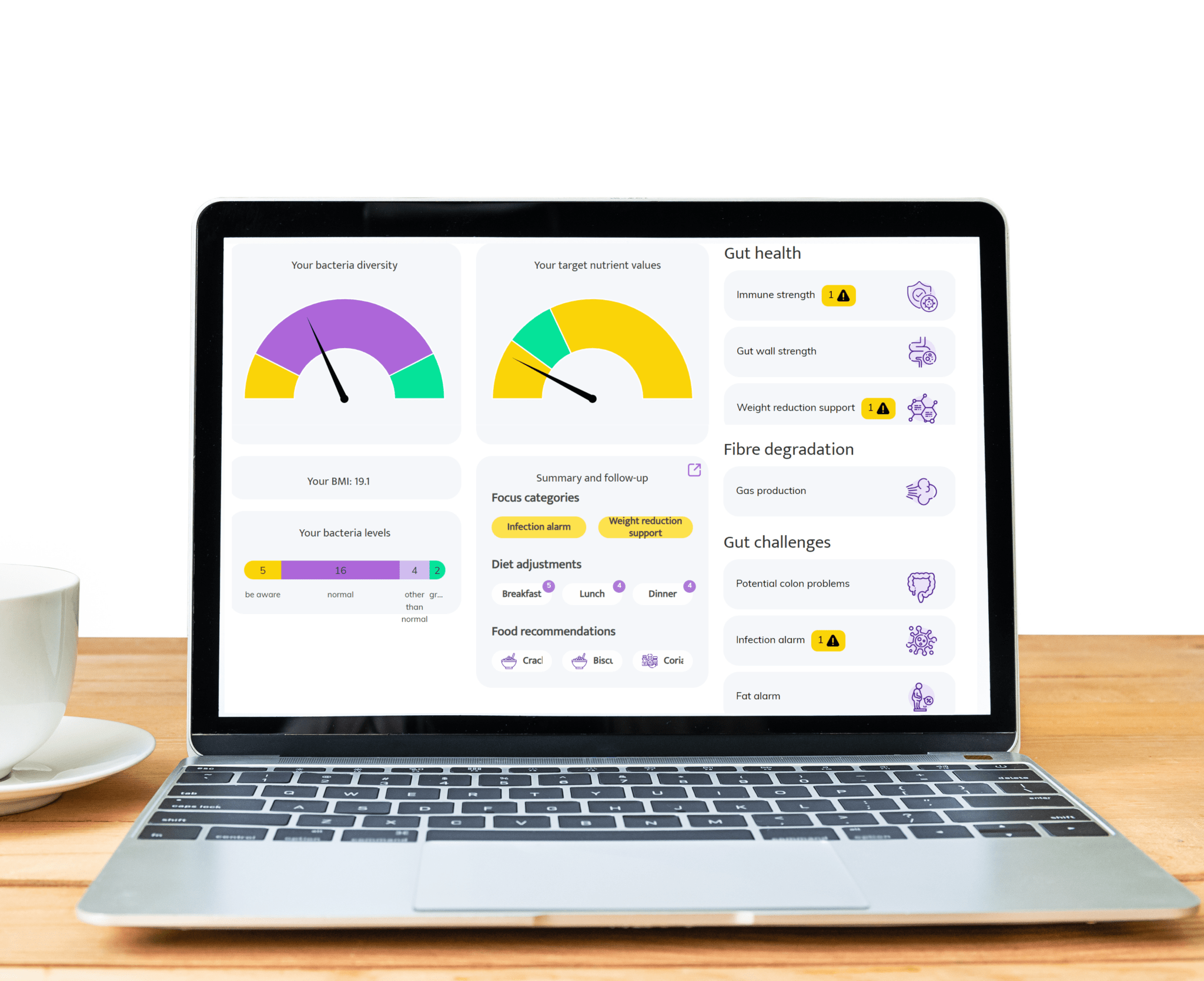Happiness is in your gut!



How can we help improve your mood?
-
🧠 Happy Molecule
Did you know that 90% of your happy molecule, serotonin, is produced in the gut? The bacteria can also influence the amount and the availability of your serotonin, meaning the gut can determine your mood and emotional well-being.
-
🦠 Happy Bacteria
There are certain “good bacteria” in the gut that have been shown to reduce symptoms of anxiety and depression. These bacteria reduce inflammation and improve your immune system. A happy gut really is a happy you!
-
🔬Team of Experts
Not only do we use the most accurate and reliable testing methods, but we also have a team of experienced dietitians, gut health specialists, and scientists. They combine their knowledge and skills, spending hours on creating the most accurate, evidence-based test and recommendations for you.
-
✨ Quick & Easy
Taking care of your gut has never been easier! Our gut microbiome analysis can be done in the comfort of your own home with our easy-to-use testing kit. Simply collect your sample and send it back to us. We'll take care of the rest. Plus, we offer free shipping to make the process hassle-free.
-
🧬 Science-Based
With our competitive pricing, you get the best bank for your buck! Our test is based on cutting-edge scientific research and DNA testing technology. We use the most accurate methods to analyze your unique gut microbiome composition, providing you with reliable and actionable insights.
-
🥑 Personalised Nutrition
Our analysis goes beyond just identifying the bacteria in your gut microbiome. We offer nutrition advice, “do’s and don’t”, based on your specific results. This means that you can immediately start supporting your gut health as soon as you receive your results!
Who are we?
InnerBuddies is a company born out of a shared passion for the gut microbiome. Professor Koen Venema and Jella Theeuwen, together with partners, embarked on an exciting journey. Koen, a passionate microbiologist, crossed paths with Jella, a dedicated dietitian with a lifelong love of healthy eating.
Their shared vision led to the foundation of InnerBuddies, a company that originated as a spin-off from Maastricht University in Venlo. Based on Koen's expertise and Jella's insights, InnerBuddies started in October 2021. Fueled by their desire to help individuals, they translate scientific knowledge into practical solutions.
Together with their partners and a small but dedicated team, they work to unravel the mysteries of the gut microbiome. InnerBuddies wants to give you the tools to take charge of your gut health through the transformative power of nutrition.
Hear from our satisfied customers!
-
"I would like to let you know how excited I am. We had been on the diet for about two months (my husband eats with us). We felt better with it, but how much better was really only noticed during the Christmas vacations when we had received a large Christmas package and didn't stick to the diet for a while. Well that did give motivation again, because what a difference in gastrointestinal symptoms but also energy in both of us!"
- Manon, age 29 -
-
"Super help!!! I was already well on my way, but now I know for sure what I should and should not eat, drink. I have been struggling with stomach and intestines for so long, hope I can get rid of it now."
- Petra, age 68 -
-
"I have read your comprehensive report and advice. Many thanks for that and very informative. Presented in this way, I can certainly move forward with it. Therefore no new questions for now. I will gladly take your suggestions to heart. And good luck with your important work."
- Dirk, age 73 -

Frequently Asked Questions
The Relationship Between Mood and the Gut Microbiome
What is the gut microbiome?
What is the gut microbiome?
The gut microbiome refers to the trillions of bacteria, viruses, fungi, and other microorganisms that live in the digestive tract. These microorganisms play a crucial role in digestion, immunity, and overall health. The balance and diversity of the microbiome are important for maintaining bodily functions.
How is the gut microbiome related to mood?
How is the gut microbiome related to mood?
The gut microbiome and mood are linked through the "gut-brain axis," a communication network between the gut and the brain. Signals sent through the gut microbiome can influence the brain's neurotransmitters, hormones, and immune response, all of which affect mood and mental health. Research suggests that an imbalance in gut bacteria may contribute to mood disorders like anxiety, depression, and stress.
Can a poor gut microbiome cause mood disorders?
Can a poor gut microbiome cause mood disorders?
Yes, an unhealthy or imbalanced microbiome has been associated with an increased risk of mood disorders. Dysbiosis (an imbalance of gut bacteria) can affect the production of neurotransmitters such as serotonin, which is a key regulator of mood. Studies have found that imbalances in the gut microbiome may contribute to conditions like depression and anxiety.
Can improving the gut microbiome improve mood?
Can improving the gut microbiome improve mood?
There is evidence suggesting that improving the balance of gut bacteria can have a positive effect on mood. Strategies like consuming probiotic-rich foods (e.g., yogurt, kefir, kimchi) and prebiotics (e.g., fiber-rich foods like fruits, vegetables, and whole grains) may help support a healthy microbiome. Additionally, reducing stress, getting regular exercise, and maintaining a balanced diet can also promote a healthy gut, which may positively influence mood.
What role do neurotransmitters play in the gut-brain connection?
What role do neurotransmitters play in the gut-brain connection?
Neurotransmitters, such as serotonin and dopamine, are chemical messengers that help regulate mood and behavior. Approximately 90% of serotonin is produced in the gut, and its production can be influenced by the gut microbiome. An imbalance in gut bacteria can affect serotonin levels, potentially leading to mood disturbances such as anxiety and depression.
How do stress and anxiety affect the gut microbiome?
How do stress and anxiety affect the gut microbiome?
Chronic stress and anxiety can negatively impact the gut microbiome, potentially leading to dysbiosis. Stress triggers the release of hormones like cortisol, which can disrupt the balance of bacteria in the gut. In turn, an imbalanced microbiome can worsen feelings of anxiety and stress, creating a cycle of negative feedback.
Can antibiotics affect mood through the gut microbiome?
Can antibiotics affect mood through the gut microbiome?
Yes, antibiotics can alter the composition of the gut microbiome by killing both harmful and beneficial bacteria. This disruption can lead to an imbalance in gut bacteria, which may affect mood and mental health. It's important to use antibiotics only when necessary and under the guidance of a healthcare professional.
Are there specific foods that improve the gut microbiome and mood?
Are there specific foods that improve the gut microbiome and mood?
Yes, certain foods can support a healthy gut microbiome, potentially improving mood. These include:
- Probiotic-rich foods (yogurt, kimchi, sauerkraut, kefir)
- Prebiotic-rich foods (bananas, garlic, onions, asparagus, leeks)
- Fiber-rich foods (whole grains, fruits, and vegetables)
- Omega-3 fatty acids (fatty fish, walnuts, flaxseeds)
- Polyphenol-rich foods (dark chocolate, berries, green tea)
These foods can help foster a diverse and balanced gut microbiome, which may positively influence mood.
Can probiotics or supplements help with mood regulation?
Can probiotics or supplements help with mood regulation?
Probiotics and certain supplements are being studied for their potential benefits in improving mood and mental health. Some research suggests that probiotic supplementation may help reduce symptoms of depression and anxiety by restoring the balance of gut bacteria. However, more research is needed to determine the full extent of their effectiveness.
Is the connection between the gut microbiome and mood well-established?
Is the connection between the gut microbiome and mood well-established?
While there is a growing body of research linking the gut microbiome to mood and mental health, the field is still in its early stages. Many studies are based on animal models, and while some human studies show promising results, more large-scale, longitudinal research is needed to fully understand the mechanisms and potential treatments related to the gut-brain connection.
What lifestyle changes can support a healthy gut microbiome and mood?
What lifestyle changes can support a healthy gut microbiome and mood?
To support both a healthy gut microbiome and mood, consider the following lifestyle changes:
- Eat a diverse, balanced diet rich in fruits, vegetables, whole grains, and fermented foods.
- Exercise regularly to promote a healthy gut and reduce stress.
- Manage stress through practices like mindfulness, yoga, or deep breathing exercises.
- Get adequate sleep, as poor sleep can negatively affect the gut microbiome and mood.
- Limit the use of antibiotics unless prescribed by a healthcare provider.
Can gut health affect cognitive function and mental clarity?
Can gut health affect cognitive function and mental clarity?
Yes, the gut microbiome is believed to influence cognitive functions such as memory, learning, and mental clarity. Research is exploring how gut health impacts neurodevelopment and age-related cognitive decline. A balanced microbiome supports better brain function, potentially improving focus, mental clarity, and overall cognitive performance.
Are there any risks in focusing too much on gut health for mood regulation?
Are there any risks in focusing too much on gut health for mood regulation?
While improving gut health may have positive effects on mood, it is important to take a holistic approach to mental health. Focusing solely on the gut microbiome without addressing other factors like emotional well-being, physical health, and social support may not be enough. Always consult a healthcare provider for personalized advice and treatment plans, especially if you are dealing with severe mood disorders or mental health issues.
What are the next steps in research on the gut-brain connection?
What are the next steps in research on the gut-brain connection?
Future research is focusing on further understanding the complex interactions between the gut microbiome and brain function. Researchers are studying the specific bacterial strains involved in mood regulation, the impact of diet and lifestyle on gut health, and the potential of microbiome-based therapies for treating mood disorders.

